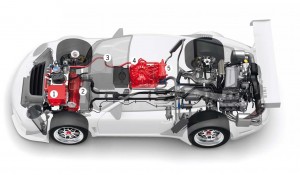Picking up on a concept its company founder first conceived of more than a century ago, Porsche will lift the covers on a hybrid race car at the upcoming Geneva Motor Show.
Dubbed the 911 GT3 R Hybrid, the goal of the project is to not just improve performance, but also the efficiency of modern race cars.
The 911 GT3 R skips the conventional hybrid route, which relies on heavy batteries to temporarily store energy normally lost during braking and coasting, then tap that power when the driver needs an extra boost. Porsche’s approach is to store energy in a high-tech flywheel.

This cutaway shows the basics of the 911 GT3 R Hybrid, starting with 1) the power electronics, 2) the two front axle-mounted motors, 3) the high-voltage cable, 4) the electrical flywheel, and 5) additional power electronics.
The 911 GT3 R Hybrid has two electric motors on its front axle, each developing 60 kilowatts, to supplement the race cars 480 horsepower internal combustion engine. That naturally-aspirated flat-six powerplant drives the GT3’s rear wheels.
The flywheel serves a dual purpose: spinning at up to 40,000 RPMs, it can function as a generator, to mechanically capture and store energy, but once it spins up, that power can be reused to drive the front wheels, say, when coming out of a turn or passing. Porsche estimates this will provide enough energy for a six to eight-second burst of added performance.
Porsche is also betting that the hybrid system will improve fuel economy, something that has become more important as motor sports regulators put limits on fuel usage. Porsche says it could either reduce the size of the car’s fuel tank or cut back on the number of time-wasting pitstops.
The German maker, which is developing a more conventional, battery-based hybrid system for its Cayenne and Panamera models, lays claim to being the first manufacturer to produce a hybrid – 110 years ago, it turns out, when founder Ferdinand Porsche introduced the Lohner-Porsche.
But Porsche is not the first to investigate the use of flywheel technology on a race car. Chrysler experimented with that approach more than a decade ago, with a concept vehicle dubbed Patriot. The prototype had a variety of problems, including issues with the gyroscopic effect created by a fast-spinning flywheel.
Porsche apparently believes it has solved such fundamental challenges and following the Geneva Motor Show preview of the 911 GT3 R Hybrid, the car will begin a series of “racing labs,” real world track testing set to begin on May 15-16, when it is entered into the 24 Hours of the Nordschliefe of Nurburgring. Porsche officials caution they don’t expect to win but do hope to gain “hand-on know-how” about the use of hybrid technology in a race car.

